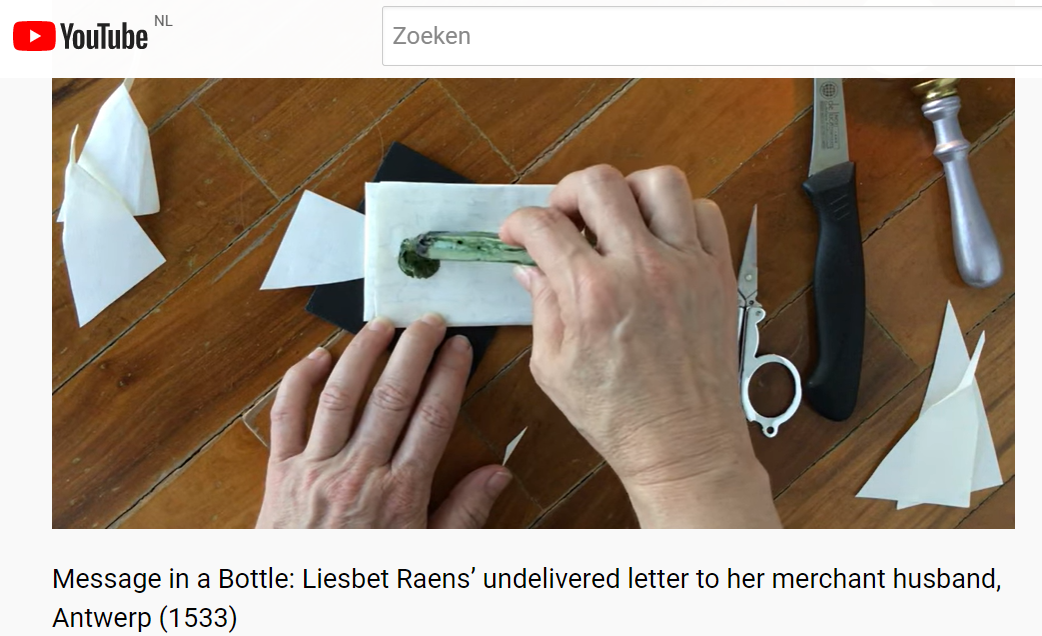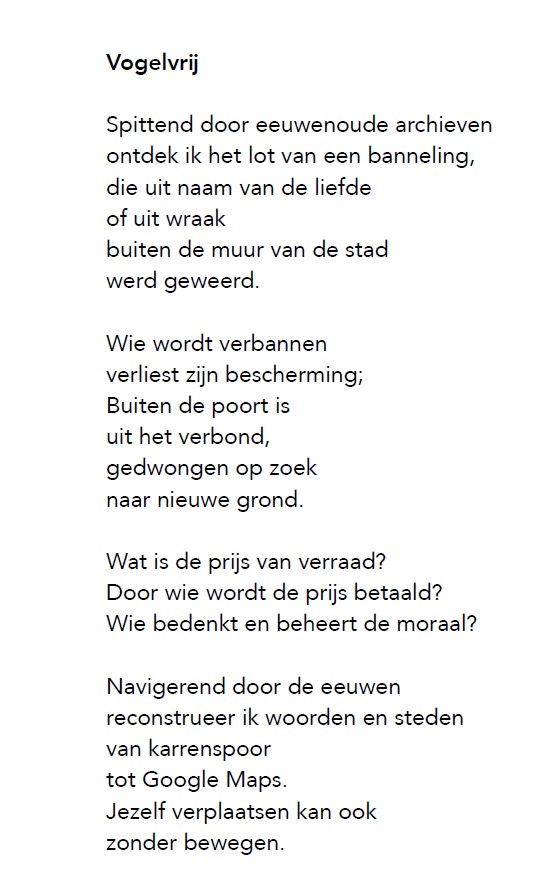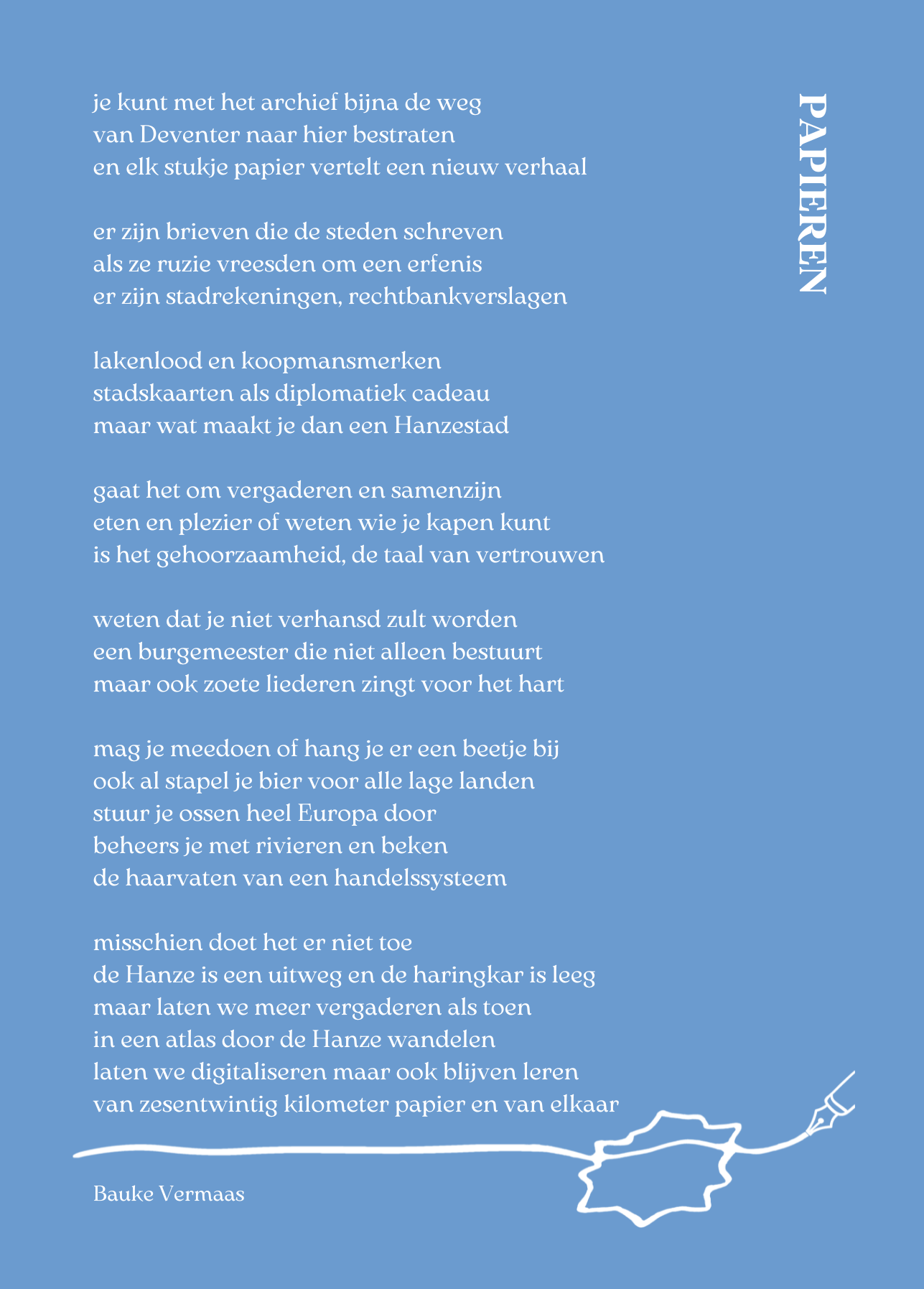Message in a Bottle: a letter modelled by letterlocking.org!
Justyna Wubs-Mrozewiczhttps://www.youtube.com/watch?v=UvSorJJhCNQ
How exciting: letterlocking.org has modelled the letter of Liesbet Raens (1533) from the forthcoming book publication Message in a Bottle. Merchants' letters, merchants' marks and conflict management in 1533-34. A source edition!
From the video description:
Modelled after a letter from Liesbet Raens to Claes Rains, Antwerp (25 July 1533), Archives of the Hanseatic City of Lübeck (Archiv der Hansestadt Lübeck) Altes Senatsarchiv (HL AHL ASA), Externa Anglicana 476, folder with letters, nr. 14.
This locked letter is one of the oldest preserved letters by a non-elite woman in the Low Countries. It was sent from Liesbeth Raens in Antwerp to her husband Claes Rains in London. While in transit, the ship which carried it was captured and the letter was taken as booty, then eventually archived and only opened in the 1990s. The letter is part of a collection of merchant and private letters sent from Antwerp to London in 1533. The senders were English, Dutch, and Hanseatic merchants and their families, and the addressees were both Londoners and residents from the Hanse area and the Low Countries in Europe. Claes Raens belonged to the latter category. His wife Liesbet sent him some news and important business information, and admonished him to take good care of his health (‘don’t get ill!’). She was clearly a busy woman, running the enterprise together with her husband. The letter is a vital business tool, and probably a holograph (“written in haste by me, Liesbet”). This would not be unusual as literacy was high among women in the premodern Low Countries – yet this type of letter hardly ever survives from this period, let alone in holograph. Liesbet was probably also the letterlocker.
After writing, the letterlocker folded the paper, and threaded a paper lock through a slit made through the whole packet (perpendicular to the short edge of the letterpacket). The tip of the lock was splayed after it passed through a slit. Adhesive was then pressed over the splayed tip, and the address written so that it was written partially on the lock as well as the address panel, perhaps as an anti-tamper enhancement.
On the original letter, we can see that a rectangular strip is missing from one bottom corner. It is possible that part of this strip was used to fashion the lock (a lock-SU, which would increase the letterpacket’s security score to high). The lock might have been taken from another piece of paper (a lock-O, as demonstrated in the video, which receives a lower security score. Further close analysis of the lock might be able to decide this question.
It is also not clear if the letter was tucked: in our reconstruction, we show tucking, but this is conjectural, based on other letters we have seen in this collection. The letter is therefore one of four letterlocking category options: 15L if a lock-O (16L if tucked) or 23H if a lock-SU (24H if tucked). In its folded manifestation, based on the number of sides and the orientation of the address, the letterpacket has a rectangle-wide format.
We don’t know who cut the bottom right corner of the letter substrate, or when. It may have been Liesbet herself, or someone else for the lock or other purposes, or perhaps while opening (though this is an unlikely scenario). This peculiarity does not occur in the other letters found in this cache.
For more on this collection, see Stuart Jenks and Justyna Wubs-Mrozewicz (eds.), Message in a Bottle. Merchants' letters, merchants' marks and conflict management in 1533-34. A source edition (Brepols, 2022) and https://premodernconflictmanagement.org.
Thank you to Hansestadt Lübeck, Fachbereich Kultur und Bildung, Archives of the Hanseatic City of Lübeck (Archiv der Hansestadt Lübeck), and special thanks to Dr Dominik Kuhn. This video was financed by the Dutch Research Council, the Seaver Institute, and the Massachusetts Institute of Technology Libraries. Filmed and demonstrated by Jana Dambrogio.
Citation information: Authors: Justyna Wubs-Mrozewicz, Jana Dambrogio, Daniel Starza Smith, and the Unlocking History Research Group. Title: "Message in a Bottle: Liesbet Raens’ undelivered holograph letter to her merchant husband, Antwerp (1533)". Letterlocking Instructional Videos. Unlocking History number 6127 / Letterlocking Unique Video number: 265. Date filmed: 31 May 2022. Duration: 5:36. Date posted: 10 June 2022. Video URL: [See URL below]. Date accessed: [Date].
Copyright 2022. Jana Dambrogio, Daniel Starza Smith, and Massachusetts Institute of Technology (MIT). All rights reserved. The following copyrighted material is made available under the Creative Commons Attribution-NonCommercial 4.0 International (CC BY-NC 4.0) License https://creativecommons.org/licenses/.... Contact the MIT Technology Licensing Office for any other licensing inquiries.
Youtube URL: https://youtu.be/UvSorJJhCNQ
Licentie
Creative Commons-licentie - Naamsvermelding (hergebruik toegestaan)



